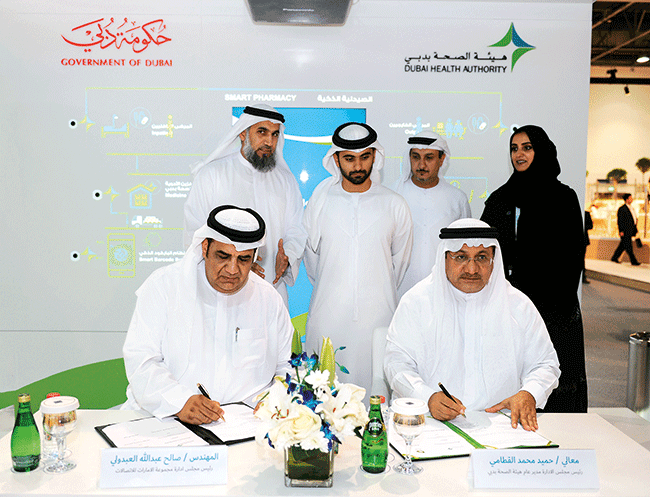
Dubai Health Authority (DHA) and Etisalat signed an agreement on the sidelines of the 37th edition of Gitex Technology Week to launch an app that will support doctors in stroke diagnoses more accurately and from anywhere.
His Excellency Humaid Al Qutami, Chairman of the Board and Director-General of DHA, and Eng. Saleh Al Abdooli, CEO of Etisalat Group, signed the MoU on Monday, in the presence of Shaikh Mansour Bin Mohammad Bin Rashid Al Maktoum.
As part of the MoU, which was signed at the DHA stand at the Dubai World Trade Centre, Etisalat will provide the DHA with the Join — Medical Communication app. Dubai is the first city in the Middle East and North Africa to use the app, which aims to provide faster communication between paramedics and the hospital, transfer patient in record time to get treatment and optimise high-standard quality health services in Dubai.
Al Qutami said the adoption of the app, which aims to deliver care for acute stroke and myocardial infarction, is in line with the Dubai Government’s vision of transforming the emirate into a smart government.
Al Abdooli said Etisalat is honoured to be partnering with DHA to launch this project and looks forward to sharing the telecom operator’s expertise to develop a digital-based healthcare solution that contributes to improving the quality of health services in Dubai.
In the first phase, which will last three months, the app will be adopted in Rashid Hospital. Next year the app will be rolled out to all DHA facilities. The following phase the app will see some private hospitals be part of the chain.
Dr Suhail Al Rukn, Director of Neurology Residency Programme at Rashid Hospital, said paramedics will be able to communicate with DHA hospitals through the app and send a medical brief that includes the patient’s medical history, their health card and even take pictures and videos of the patient. The information will then be sent to the hospital so that they can prepare to treat the patient ahead of their arrival.
“The brief will be received by the chain of carers that include the ER nurse, ER doctor, radiologist, neurologist and cardiologist so that they can prepare to do the needful,” Dr Al Rukn explained.
“The hospital will also be able to notify the paramedics in the case of any issues — for example if the CT scan machine is not working, the hospital can notify the paramedics so that they can deliver them to another hospital.”












